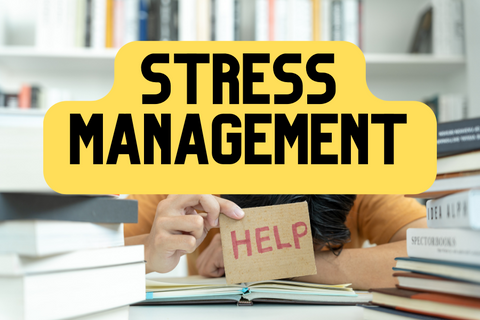Managing Anxiety & Stress - Strategies for a BALANCED life

In today's fast-paced world, managing anxiety and stress has become a crucial skill for maintaining both mental and physical well-being. The pressures of work, personal relationships, and daily responsibilities can often lead to overwhelming feelings of anxiety. However, with the right strategies and techniques, you can effectively manage and reduce these stressors. In this blog post, we'll explore various approaches to help you achieve a more balanced and peaceful life.
1. Practice Mindfulness and Meditation: Mindfulness involves focusing your attention on the present moment without judgment. Meditation is a powerful tool that can help you achieve this state of mindfulness. Regular meditation sessions, even for just a few minutes a day, can help reduce anxiety, promote relaxation, and improve your overall mental clarity.
2. Prioritize Self-Care: Taking care of yourself should be a top priority. Engage in activities that bring you joy and relaxation, whether it's reading a book, taking a long bath, practicing a hobby, or spending quality time with loved ones. Regularly setting aside time for self-care can significantly reduce stress levels.
3. Maintain a Healthy Lifestyle: Physical health and mental well-being are interconnected. Engage in regular exercise, eat a balanced diet rich in nutrients, and ensure you're getting enough sleep. These factors contribute to a stronger body and a calmer mind.
4. Breathing Exercises: When anxiety strikes, deep breathing exercises can help calm your nervous system. Practice deep, slow breaths, focusing on the rise and fall of your abdomen. This technique can be done anywhere and has an instant calming effect.
5. Stay Organized: A cluttered environment can contribute to feelings of stress and overwhelm. Keep your living and working spaces organized. Use planners or digital tools to manage your tasks and schedule, allowing you to stay on top of your responsibilities.
6. Reach Out for Support: Don't hesitate to share your feelings with trusted friends, family members, or a mental health professional. Talking about your worries can provide relief, and seeking professional help ensures you're getting the support you need.
7. Limit Screen Time: Constant exposure to screens and digital devices can contribute to heightened stress and anxiety. Dedicate screen-free time each day for relaxation, social interactions, and other non-digital activities.
8. Practice Gratitude: Focusing on the positive aspects of your life can shift your perspective and reduce stress. Keep a gratitude journal, noting down things you're thankful for each day. This practice can help you cultivate a more optimistic outlook.
9. Engage in Relaxation Techniques: Explore different relaxation techniques such as progressive muscle relaxation, visualization, or aromatherapy. These methods can activate your body's relaxation response and counteract the effects of stress.
10. Set Realistic Goals: Setting achievable goals can help you manage feelings of overwhelm. Break larger tasks into smaller, manageable steps and celebrate your progress along the way.
Managing anxiety and stress is a lifelong journey that requires dedication and self-awareness. By incorporating mindfulness, self-care, healthy habits, and a supportive network, you can navigate life's challenges with resilience and inner peace. Remember that seeking professional help is always an option if you find yourself struggling to manage your anxiety effectively. Prioritize your mental well-being and take proactive steps towards a more balanced and fulfilling life.
